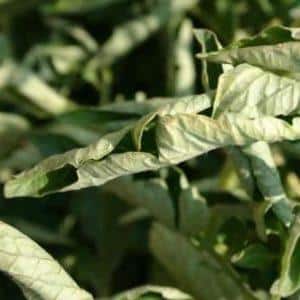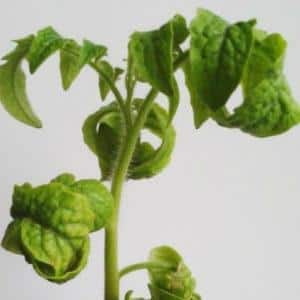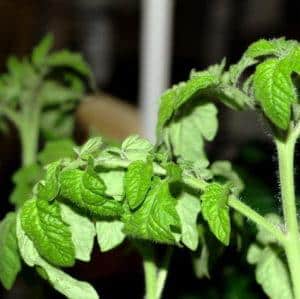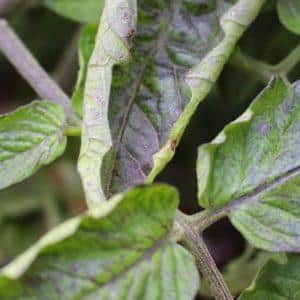What to do when tomato leaves curl
Growing tomatoes is not difficult if you approach it responsibly. But sometimes even experienced gardeners make mistakes, and the harvest is not as rich as expected. To make tomatoes in the garden beds pleasing to the eye, you need to pay attention not only to the growing process, but also to the fight against external factors that can negatively affect the harvest.
If the plant begins to wither, it is necessary to identify the cause as soon as possible. In this article we will look in detail at what to do when the leaves on tomatoes curl.
Why do the leaves curl?
There may be several reasons why leaves curl in tomatoes. They depend both on improper care and on the influence of external factors.
Among them are the following factors:
- lack of moisture;
- excess watering;
- plant damage by pests;
- high air temperature;
- errors in pinching;
- disruption of the plant nutrition process due to an imbalance of fertilizers.
Reasons why tomato leaves curl open ground or in a greenhouse, quite a lot. Let's look at each separately.
Lack of moisture
 Experienced gardeners begin to water tomatoes only when the tips of the leaves begin to droop slightly. This is how the plant itself tells you that it does not have enough water in the stem and leaves.
Experienced gardeners begin to water tomatoes only when the tips of the leaves begin to droop slightly. This is how the plant itself tells you that it does not have enough water in the stem and leaves.
If you skip this moment and do not water the tomato bush, the plant will begin to curl its leaves. It does this to reduce the surface area of the leaf from which evaporation occurs.If this situation occurs during tomato flowering, the flowers may fall off due to lack of water.
How to fix the situation: water the bush in several approaches at the rate of 3-5 liters per plant per watering. Afterwards, you need to ensure regular soil moisture.
Attention! Do not overwater the plants. Both lack and excess of water can damage the crop.
Watering too much
Leaves can also curl due to excess water. If tomatoes grow in greenhouse, then you can combat curling by stopping watering, as well as by using regular ventilation, which helps to quickly reduce the moisture level.
If excess water is observed in open ground and is associated with rain, the situation can be corrected by making a film roof over the bed. It will protect the soil under the tomatoes from excess water. Good results are obtained by loosening the soil, which helps dry it out faster.
High air temperature
In hot weather, especially in direct sunlight, tomato leaves also curl. This is how they protect themselves. When the heat subsides, they spin back up.
How to help plants:
- in the greenhouse – ventilation;
- in an open garden – shading. You can cover a tomato bush with agrofibre or spunbond (special material).
Malnutrition due to fertilizers
 Most often, gardeners overfeed tomatoes with nitrogen fertilizers. If the soil where tomatoes grow is provided with too much manure, the upper leaves may curl into a ring. The solution to the problem will be the elimination of nitrogen in fertilizing.
Most often, gardeners overfeed tomatoes with nitrogen fertilizers. If the soil where tomatoes grow is provided with too much manure, the upper leaves may curl into a ring. The solution to the problem will be the elimination of nitrogen in fertilizing.
But plant nutritional disturbances can also occur when the bushes are not fertilized. The cause of leaf curling may be a lack of microelements. The tips of the leaves may dry out.
Usually in such cases there are not enough tomatoes:
- phosphorus. In this case, the leaves curl away from the stem at an acute angle and can change color (take on a purple tint);
- potassium Then the leaves curl up and become curly.
To replenish the supply of microelements, wood ash is used. Feeding make by mixing 1 liter of ash and 10 liters of water. For better release of nutrients, it is recommended to boil the ash solution. The average consumption of the decoction is 1 liter per bush.
Attention! Tomatoes are fed with a completely cooled solution.
Ash can also be used in dry form. It is poured directly onto the ground at the root of the plant. Ash consumption is 0.3-0.5 cups per bush.
Incorrect stepsoning
 Tomato growers often plant their tomato bushes – remove shoots in the axils between the trunk and leaves of the tomato plant. This is believed to conserve plant nutrients and improve the quality of the crop.
Tomato growers often plant their tomato bushes – remove shoots in the axils between the trunk and leaves of the tomato plant. This is believed to conserve plant nutrients and improve the quality of the crop.
It is worth remembering that after unsuccessful pinching, tomato leaves may begin to wither and curl their edges. This happens if many stepsons, especially large ones, are removed at one time. Wilting is associated with severe stress experienced by the plant. Sometimes tomatoes even drop their flowers after an incorrect procedure.
To help the plant, you can do foliar feeding. Tomatoes respond well to treatment with boron solution. To obtain it, dilute 0.5 teaspoon of boric acid in 10 liters of water. Afterwards, the plant is irrigated abundantly with a spray bottle.
Carefully! It is better to dissolve boric acid crystals in hot water. They will not dissolve in cold water, and burns may appear on the tomato leaves.
Insect pests
Tomatoes may be affected pests, from which the leaves begin to turn yellow or curl upward.
The most common insects that harm tomatoes are:
- whitefly Flying small midge with white wings. It is detected if the plant is shaken (it flies up when disturbed), as well as upon inspection (whitefly larvae stick to the leaves, leaving a sticky coating on the surface);
- aphid. The favorite delicacy of aphids is young tender leaves. The pest sucks the plant juice from the leaves;
- ticks. For example, rusty. It harms not only the leaves, but can also penetrate into the trunk and fruits. The leaves begin to curl, often rusty or brown cracks appear on them.
How to treat tomatoes for leaf curl
 How to treat upward curling of leaves in tomatoes if the cause is pest infestation?
How to treat upward curling of leaves in tomatoes if the cause is pest infestation?
To treat tomato bushes from pests do:
- garlic solution. Take 1 liter of water and 150-200 g of chopped garlic. Keep for 5 days. This is how garlic concentrate is obtained. To treat tomato bushes, dilute 1-2 tablespoons of concentrate per 1 liter of water. Then the leaves of the plants are sprayed generously;
- tincture of wormwood. The concentrate is prepared by infusing 500-650 g of wormwood in 5 liters of boiling water for 2-3 days. To irrigate the bushes, mix 9 liters of water and 1 liter of concentrate;
- tobacco tincture. Chopped tobacco (about 200 g) is poured with boiling water (5 l) and left for 1-2 days. The bushes are sprayed with the solution (you can add 100 g of laundry soap).
Attention! Experienced tomato growers advise repeating the treatment after 3-5 days.
What to do for prevention
The best protection against pests is prevention. Even before planting the tomatoes, it is recommended to thoroughly dig up the soil and pour boiling water or a solution of copper sulfate (dosage - according to the instructions on the package).
Try to grow tomato varieties and hybrids that are resistant to insect pests.
Important! Follow the rules of crop rotation, and do not grow tomatoes for many years in a row in the same place. It is advisable that 3-4 years pass before you return the tomatoes to the same bed.
Conclusion
There are many reasons for leaves curling on tomatoes. There is both an excess of watering and a lack of it. The condition of the leaves is affected by both a lack of microelements and an excessive amount of fertilizer. Insect pests also contribute. It is important to correctly recognize the cause and correct the situation. Then tomatoes will definitely please you with a good harvest.